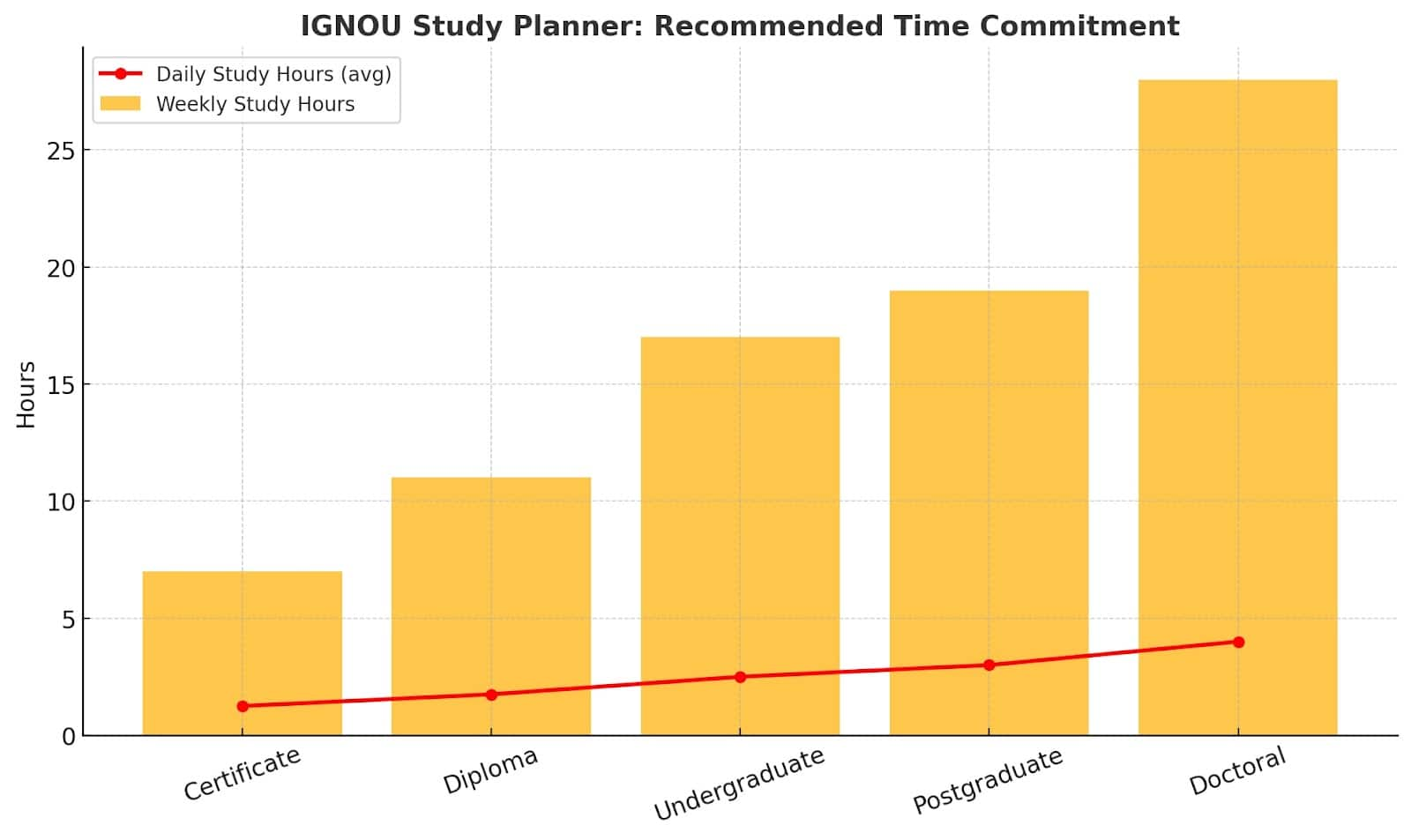Level-Wise Study Plans
Whether you are enrolled in a short certificate, a skill-based diploma, an undergraduate degree, a master’s programme, or a doctoral course, your daily and weekly study habits play a big role in shaping outcomes. It is important to break down study plans for each level, which will help you balance theory, assignments and real-world applications while making full use of IGNOU’s unique resources.
Certificate Students: Master the Basics
Certificate courses are short and sharp, perfect for quick upskilling. IGNOU issued 1,61,150 certificates in the last year alone.
Daily (1–1.5 Hours): Spend 30 minutes reading your Self Learning Material (SLM), 20 minutes watching IGNOU e-Content or SWAYAM videos, and 20 minutes drafting notes or assignments.
Weekly (6–8 Hours): Revise twice a week and solve one set of past TEE questions over the weekend.
Student Tip: Use your commute time to listen to GyanVani FM or podcasts. Even as little as 15 minutes daily listening to FM and Podcasts will add up substantially to the overall understanding and learning of the subject.
Diploma Students: Apply What You Learn
Diplomas go deeper and often include practical work. IGNOU awarded 52,559 diplomas last year in areas like Dairy Technology, Watershed Management, and Creative Writing.
Daily (1.5–2 Hours): Dedicate 45 minutes to theory, 30 minutes to online lectures, and 30 minutes to assignments or practical logs.
Weekly (10–12 Hours): Set aside one day just for applied tasks, fieldwork, case studies, or lab practice.
Student Tip: Join or start a WhatsApp/Telegram group with batchmates. Peer discussions keep you motivated and accountable.

Undergraduate Students: Balance Theory and Practicals
UG programmes are the largest at IGNOU, with 1,13,876 degrees awarded in 2022–23. With CBCS (Choice-Based Credit System), you can customise your learning journey.
Daily (2–3 hrs): 1 hour reading, 30 min for video/audio lectures (GyanDarshan TV or YouTube), 45 min writing TMAs (assignments), and 30 min self-testing.
Weekly (15–18 hrs): Block weekends for labs, practical work, or group revision.
Student Tip: Don’t wait until the last week for assignments. Write 1–2 questions every week, and the workload at the end becomes much easier to manage.
Postgraduate Students: Dive Deep
At PG level, depth matters. IGNOU awarded 1,08,911 master’s degrees last year, covering programmes from MBA to MA in Journalism, Sustainability, and more.
Daily (2–4 Hours): Spend 1.5 hours reading advanced material, 1 hour analysing research papers, and 30–60 minutes writing assignments or dissertations.
Weekly (18–20 Hours): Dedicate one day to seminar participation, online group discussions, or connecting with mentors.
Student Tip: Use the IGNOU e-Content app to read journal articles and references on the go. Turn idle time into study time.
Doctoral Students: Research with Discipline
If you are pursuing a Ph.D. or M.Phil., your focus is research. IGNOU currently has 762 active Ph.D. students across 23 disciplines, with 359 theses already submitted to Shodhganga.
Daily (3–5 Hours): 2 hours literature review, 1 hour thesis writing, and 30–60 minutes on data analysis or methodology.
Weekly (25–30 Hours): Reserve weekends for writing research papers and supervisor discussions.
Student Tip: Join IGNOU’s Innovation Club or attend webinars. Sharing your research ideas early sharpens them faster.
No matter which level of study you pursue at IGNOU, consistency is the key to success. By setting aside dedicated hours daily and weekly, you can manage assignments, revision, and practical work without last-minute stress. Small steps like listening to lectures during travel or writing a few assignment answers weekly can make a big difference over time.
Student Support at IGNOU
At IGNOU, distance learning doesn’t mean learning alone. The university has established one of India’s strongest student support systems, providing guidance, resources, and opportunities for interaction for every learner.
Regional & Learner Centres
69 Regional Centres (including Army, Navy, Assam Rifles, and Leh) and 2,062 Learner Support Centres provide counselling, assignment help, and exam guidance. Over 51,000 academic counsellors support students.
MOOCs & Online Learning
IGNOU offers 193 SWAYAM MOOCs with 13.5 lakh+ learners, 126 courses adopted by universities for credit transfer. Many courses are available in eight regional languages.
TV, Radio & Web
GyanDarshan TV, SWAYAM PRABHA channels, and GyanVani FM broadcast 13 hours of daily lectures and counselling. Interactive Radio Counselling and Gyandhara internet radio enable direct faculty interaction.
Web Academic Support (WEAS)
The c portal supports 45 programmes with e-content, counselling, and updates. Students also access materials through the IGNOU e-Content App and eGyankosh repository.
Grievance & Counselling
The Student Service Centre resolved 4.28 lakh grievances and 58 lakh queries in 2022–23. Regional Centres held 1,073 induction sessions for new learners.
Support for Marginalised Learners
IGNOU operates Special Centres for Persons with Disabilities, enrolling over 4,200 students with disabilities. Accessible resources include 6.77 lakh e-books via Sugamaya Pustakalaya.
Studying at IGNOU is about building consistent habits. Whether you are aiming for a Certificate to upskill quickly or a Doctorate to push the frontiers of knowledge, the secret is the same: plan your week, stick to your daily hours, and use IGNOU’s resources smartly.
Remember, you chose IGNOU for flexibility. With the right routine, that flexibility becomes your superpower and helps you complete the programme you choose to study at IGNOU.


